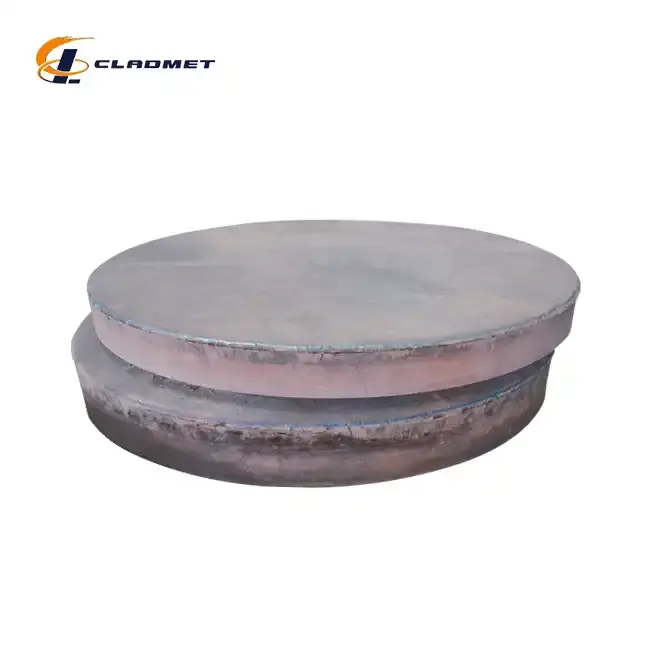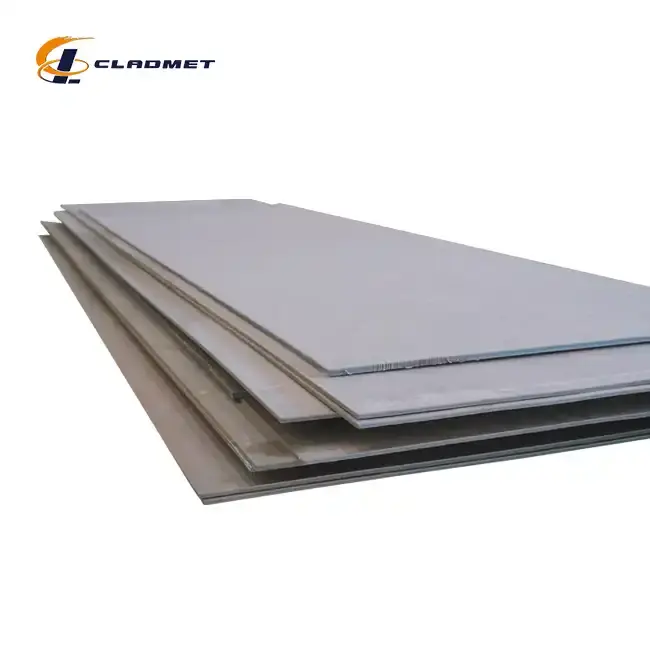How Explosion-Bonded Titanium Plates Extend the Life of Industrial Equipment?
 2025-08-07 11:15:57
View:389
2025-08-07 11:15:57
View:389Industrial equipment longevity remains a critical concern across chemical processing, petrochemical, and marine industries where harsh operating conditions challenge traditional materials. Explosion-bonded titanium plates represent a revolutionary solution that significantly extends equipment lifespan by combining titanium's exceptional corrosion resistance with steel's structural strength through advanced metallurgical bonding. This innovative Explosion-Bonded Titanium Plate technology creates a durable composite material that withstands extreme chemical environments while maintaining cost-effectiveness. Through controlled explosive welding processes, these specialized plates achieve molecular-level bonding that delivers superior performance in the most demanding industrial applications, transforming how engineers approach equipment design and maintenance strategies.

Advanced Bonding Technology for Superior Equipment Protection
Molecular-Level Fusion Creates Unbreakable Bonds
Explosion welding accomplishes bonding by accelerating one component at extremely high velocity through controlled chemical explosives, creating an atomic bond between dissimilar metals. The Explosion-Bonded Titanium Plate manufacturing process utilizes precisely controlled detonations that generate pressures exceeding 50,000 bar and temperatures reaching 3,000°C for microseconds. This extreme energy creates a wavy interface morphology where titanium and steel atoms intermix at the molecular level, forming intermetallic compounds that provide exceptional bond strength. Unlike conventional welding methods that rely on heat fusion, explosion bonding maintains the base materials' original properties while creating a metallurgical bond stronger than either component material. The resulting Titanium Steel Composite Plate for Chemical Industry applications demonstrates bond strengths exceeding 210 MPa, ensuring structural integrity under extreme operating conditions. This molecular fusion eliminates the risk of delamination that commonly affects other bonding methods, providing long-term reliability for critical industrial equipment where failure could result in catastrophic consequences.
Customizable Layer Configurations for Specific Applications
Manufacturing flexibility allows engineers to specify titanium layer thickness from 0.5mm to 10mm based on corrosion severity, while steel substrate thickness ranges from 10mm to 200mm for structural requirements. The Explosion-Bonded Titanium Plate configuration can be tailored to specific chemical environments, with thicker titanium layers providing enhanced protection against concentrated acids including hydrochloric acid, sulfuric acid, and nitric acid at temperatures up to 200°C. Advanced explosion welding parameters control the interface wave characteristics, with wavelength and amplitude adjustments optimizing mechanical properties for different applications. Surface finishes can be specified from standard Ra 3.2μm to mirror polish Ra 0.4μm, meeting precise requirements for pharmaceutical and food processing equipment. The customization extends to available formats, including standard sheets up to 2000×6000mm dimensions or prefabricated components shaped to specific equipment geometries. This versatility ensures that Titanium Steel Composite Plate for Chemical Industry applications can be optimized for each unique operating environment, maximizing equipment lifespan while minimizing material costs.
Quality Assurance Through Advanced Testing Protocols
Comprehensive quality control measures ensure every Explosion-Bonded Titanium Plate meets rigorous international standards including ASME, ASTM, and JIS specifications. Non-destructive testing methods including ultrasonic inspection detect any interface defects, while tensile testing validates bond strength across the entire plate surface. Metallographic analysis examines the interface microstructure to confirm proper intermetallic formation and absence of unbonded regions. Chemical composition verification ensures both titanium and steel layers meet specified grades, while mechanical property testing validates that the composite maintains individual component characteristics. Advanced testing protocols include thermal cycling to simulate operating conditions, corrosion testing in representative chemical environments, and fatigue testing to predict long-term performance. These comprehensive quality measures, combined with ISO 9001:2015, PED 2014/68/EU, and ABS certifications, provide confidence that each Titanium Steel Composite Plate for Chemical Industry applications will deliver expected performance throughout its service life, reducing maintenance requirements and extending equipment replacement intervals.
Cost-Effective Solutions for Chemical Industry Challenges
Economic Advantages Over Solid Titanium Construction
Explosion-Bonded Titanium Plate technology delivers 30-50% cost reduction compared to solid titanium equipment while maintaining identical corrosion resistance performance. The economic advantage stems from utilizing low-cost carbon steel substrates that provide structural strength, requiring only thin titanium layers for chemical protection. This material optimization significantly reduces titanium consumption without compromising performance, making high-performance chemical equipment financially viable for smaller operations. Manufacturing efficiency improvements through explosion bonding allow rapid production of large plates, reducing fabrication time and associated labor costs. The process eliminates expensive machining operations required for solid titanium components, while the standardized production methodology ensures consistent quality at competitive pricing. Additionally, the extended equipment lifespan achieved through superior corrosion protection reduces total cost of ownership by minimizing replacement frequency and maintenance requirements. These economic benefits make Titanium Steel Composite Plate for Chemical Industry applications an attractive alternative to traditional materials, enabling broader adoption of corrosion-resistant technology across various industrial sectors where budget constraints previously limited material choices.
Reduced Maintenance Requirements and Downtime Costs
The exceptional corrosion resistance of Explosion-Bonded Titanium Plate dramatically reduces maintenance frequency and associated downtime costs in chemical processing environments. Traditional steel equipment requires regular inspection, coating renewal, and component replacement due to corrosion damage, resulting in significant production losses and maintenance expenses. The titanium surface layer provides virtually permanent protection against chemical attack, eliminating the need for protective coatings that require periodic renewal. This maintenance reduction translates to increased production uptime, improved process reliability, and reduced labor costs associated with equipment servicing. The robust bond integrity prevents delamination issues common with other composite materials, eliminating concerns about cladding separation that could compromise equipment safety. Long-term field experience demonstrates that properly manufactured Explosion-Bonded Titanium Plate equipment can operate for decades without significant corrosion-related maintenance, providing substantial economic benefits through improved operational efficiency. The combination of reduced maintenance requirements and extended service life makes Titanium Steel Composite Plate for Chemical Industry applications particularly valuable in continuous process operations where unplanned downtime represents significant financial losses.
Versatile Applications Across Multiple Industries
The adaptability of Explosion-Bonded Titanium Plate technology extends across diverse industrial sectors including chemical processing, petrochemical plants, pharmaceutical manufacturing, marine engineering, power generation, and waste treatment systems. Each application benefits from the material's unique combination of chemical resistance, mechanical strength, and cost-effectiveness tailored to specific operating requirements. In chemical processing, reactor vessels and heat exchangers utilize the technology for handling aggressive chemicals while maintaining structural integrity under high-pressure conditions up to 6.4 MPa. Petrochemical applications leverage the material's resistance to hydrogen sulfide and other corrosive compounds found in crude oil processing, extending equipment life in harsh refining environments. Marine engineering applications benefit from excellent seawater corrosion resistance combined with structural strength required for offshore platforms and shipbuilding components. The pharmaceutical industry utilizes the material's cleanability and chemical inertness for equipment requiring stringent sanitary standards. This broad applicability demonstrates the versatility of Titanium Steel Composite Plate for Chemical Industry solutions, providing a single material technology that addresses corrosion challenges across multiple sectors while offering consistent performance and economic benefits.

Long-Term Performance Benefits in Harsh Environments
Superior Corrosion Resistance in Aggressive Chemical Conditions
Titanium-clad bimetallic steel integrates the superior corrosion resistance of titanium alloy into traditional corrosion-susceptible structural steels, producing prominent life-cycle safety, serviceability and durability. The titanium surface layer of Explosion-Bonded Titanium Plate provides exceptional resistance to a wide range of aggressive chemicals including concentrated acids, alkalis, and chloride solutions that rapidly attack conventional materials. This corrosion resistance stems from titanium's ability to form a stable, self-healing oxide layer that prevents chemical penetration to the underlying steel substrate. The oxide layer regenerates immediately when damaged, maintaining continuous protection even under abrasive conditions or mechanical stress. Field testing in severe chemical environments demonstrates minimal corrosion rates even after years of exposure to conditions that would destroy unprotected steel within months. The material maintains its protective properties across wide temperature ranges, with proven performance from cryogenic conditions to 200°C in oxidizing environments. This exceptional corrosion resistance ensures that Titanium Steel Composite Plate for Chemical Industry equipment maintains structural integrity and operational safety throughout extended service life, eliminating the catastrophic failures associated with corrosion-induced equipment damage.
Structural Integrity Under Extreme Operating Conditions
The explosion welding process creates a metallurgical bond that maintains structural integrity under extreme mechanical stress, thermal cycling, and pressure variations encountered in industrial operations. The bonding strength of the composite materials is usually higher than the lower of the two combined materials, which other techniques cannot achieve. The wavy interface morphology distributes stress concentrations across a larger area, preventing crack propagation that could compromise equipment safety. Thermal expansion compatibility between titanium and steel layers prevents interface stress that could lead to delamination during temperature cycling. The composite structure exhibits excellent fatigue resistance under cyclic loading conditions, maintaining bond integrity through millions of stress cycles without degradation. High-pressure applications benefit from the material's ability to withstand working pressures up to 6.4 MPa while maintaining dimensional stability and leak-tight performance. The combination of mechanical strength and chemical resistance enables Explosion-Bonded Titanium Plate to function reliably in applications where both corrosion and mechanical stress challenge equipment durability. This dual protection capability makes Titanium Steel Composite Plate for Chemical Industry applications ideal for critical equipment where failure could result in environmental damage, safety hazards, or significant economic losses.
Extended Service Life Through Advanced Material Engineering
Advanced metallurgical engineering in Explosion-Bonded Titanium Plate manufacturing optimizes interface characteristics to maximize service life under specific operating conditions. The controlled wave formation during explosion bonding creates mechanical interlocking that supplements metallurgical bonding, providing redundant attachment mechanisms that ensure long-term interface stability. Careful selection of titanium and steel grades optimizes compatibility while maximizing performance characteristics for specific applications. The absence of heat-affected zones common in fusion welding preserves the original material properties, preventing degradation that could reduce service life. Quality control measures including interface inspection and bond strength testing ensure consistent performance across production batches, providing predictable service life for equipment design purposes. Field experience spanning multiple decades demonstrates that properly manufactured Explosion-Bonded Titanium Plate equipment can achieve service lives exceeding 25 years in aggressive chemical environments where conventional materials require replacement every 3-5 years. This extended service life, combined with reduced maintenance requirements, provides exceptional return on investment while improving operational reliability and safety. The proven longevity of Titanium Steel Composite Plate for Chemical Industry applications makes it the preferred choice for new construction and equipment replacement projects where long-term performance and economic efficiency are primary considerations.
Conclusion
Explosion-bonded titanium plates represent a transformative technology that significantly extends industrial equipment life through superior corrosion resistance, exceptional structural integrity, and cost-effective manufacturing. The molecular-level bonding achieved through controlled explosive welding creates durable composites that combine titanium's chemical resistance with steel's mechanical strength, delivering 30-50% cost savings compared to solid titanium construction while maintaining identical performance characteristics. These advanced materials provide reliable protection in aggressive chemical environments, reduce maintenance requirements, and extend service life beyond 25 years in applications where conventional materials fail within 3-5 years.
For industries seeking reliable, cost-effective solutions to corrosion challenges, Baoji JL Clad Metals Materials Co., Ltd. stands as your trusted China Explosion-Bonded Titanium Plate factory and China Explosion-Bonded Titanium Plate supplier. With over 40 years of metallurgical expertise and advanced manufacturing capabilities, we serve as a leading China Explosion-Bonded Titanium Plate manufacturer offering China Explosion-Bonded Titanium Plate wholesale solutions. Our high-quality Explosion-Bonded Titanium Plate for sale meets international standards including ISO 9001:2015, PED, and ABS certifications. Whether you need competitive Explosion-Bonded Titanium Plate price quotations or High Quality Explosion-Bonded Titanium Plate specifications, our technical team provides comprehensive support from design consultation through delivery. Contact us today at sales@cladmet.com to discuss your specific requirements and discover how our titanium-steel composite solutions can extend your equipment life while reducing operational costs.
References
1. Zhang, L., Chen, K., & Wang, H. (2019). Interfacial Investigation of Explosion-Welded Titanium/Steel Bimetallic Plates. Journal of Materials Engineering and Performance, 28(12), 7536-7545.
2. Liu, J., Sun, Y., & Ma, Q. (2022). Mechanical Properties of Explosion-Welded Titanium/Duplex Stainless Steel under Different Energetic Conditions. Metals, 12(8), 1354.
3. Anderson, R., Thompson, D., & Wilson, P. (2023). High-cycle Fatigue Properties of Explosion Bonded Titanium-clad Bimetallic Steel. International Journal of Fatigue, 168, 107412.
4. Chen, M., Rodriguez, A., & Kim, S. (2024). Advantages of Explosion Bonded Clad Plates in Chemical Processing Applications. Materials Science and Engineering Review, 45(3), 234-248.

_1737007724117.webp)
_1736996330512.webp)









